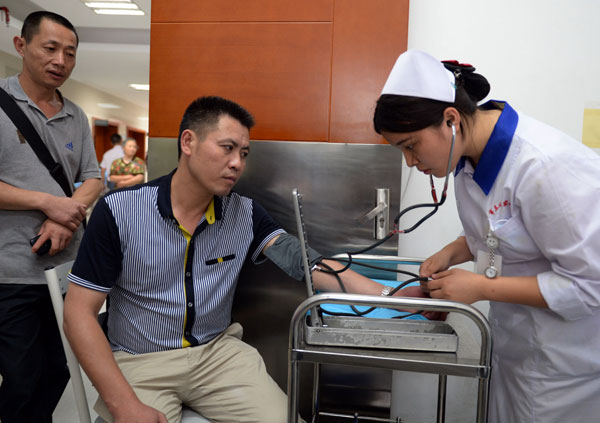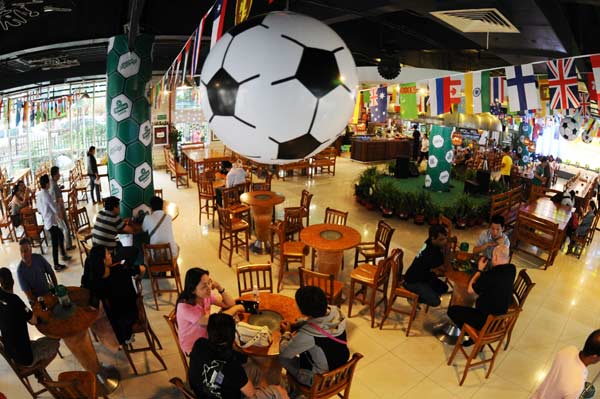
30 Jun, 2014
World Cup literally killing people in China
(China Daily) 2014-06-28 – World Cup soccer matches screened live on TV in China throughout the night are taking their toll on fans. Doctors have been treating them for a range of conditions, including coronary spasms, high blood pressure and kidney disease.
 Blood pressure is taken at a special World Cup clinic at Chengdu No 3 People’s Hospital in Sichuan province. The clinic is open 24 hours a day to treat fans who fall ill while watching games at night. [Li Xiangyu/For China Daily] |
For example, early on Friday morning, a weary middle-aged woman visited Wei Ming, head of the emergency treatment department at Chengdu No 3 People’s Hospital in Sichuan province. The patient, who once had a urinary tract infection, was diagnosed with acute pyelonephritis, a kidney disease.
“To avoid missing a single minute of a World Cup match the previous night, she didn’t answer the call of nature. As excessive urine built up in her kidneys over a long period, it induced the disease,”Wei said.
The patient was one of several at a clinic the hospital set up to treat fans who develop health problems from watching the tournament late at night.
Matches in the group stage have been screened live in China from midnight, with the final game of the night ending just before 8 am. The clinic, which is open 24 hours a day, has been treating patients for hypertension and angina after they become overexcited while watching games.
On Wednesday, an intensive care unit at Peking University First Hospital treated a 56-year-old woman who had watched every game in the tournament since it started on June 13.
She developed chest pain and was hospitalized for coronary spasms, said Han Xiaoning, a doctor in the hospital’s cardiovascular medicine department.
The patient, like two middle-aged men who were treated for cardiovascular conditions after staying up late to watch the games, smokes and has high blood pressure, Han said.
On Friday, the unit admitted a 49-year-old man with chest pain, back pain and high blood pressure. He had stayed up for several nights to watch the games.
Han said the man was diagnosed with an acute inflammation of the pancreas, which was caused by fatigue, alcohol and oily food. He also had gallstones.
Some fans also find that changing their daily schedules for the tournament has disrupted their biological clocks.
The Hunan Province Brain Hospital in Changsha has opened a special clinic to treat soccer supporters who develop health problems after staying up late at night.
Zuo Jing, a doctor at the clinic, said it receives more than 10 patients a day, most of whom have sleep disorders after watching the games. People should avoid staying up between 11 pm and 3 am and eat less oily food and drink moderately while watching matches, Zuo suggested.
Han, the doctor in Beijing, said, “For fans who want to stay up, I suggest they take a nap during the 15-minute half-time break and get enough sleep in the day.”
However, because most cardiovascular diseases offer little warning in daily life, many people are not aware of its threats, he adds. In emerging economies such as China, where hectic living is leading to sedentary lifestyles and unhealthy eating habits, a large number of young people tend to suffer from obesity and cardiovascular problems.
“While people stay up (at night) and binge on beer and high-fat food, getting excited, they don’t know they might be risking their lives,” Guo says.
He warns against staying continuously awake, and suggests that people take leave from work to sleep during the day if they aren’t able to resist the temptation of watching back-to-back matches at night.
A young person without major health issues can manage on four hours of sleep as a minimum requirement in 24 hours, but people with heart-related problems or other health issues need to sleep longer, experts say.
Sleep deprivation is bad for the stomach as well, according to Zhang Kejian, a specialist on digestive tract diseases with the Beijing-based China-Japan Friendship Hospital.
Humans have body clocks that largely factor in when to eat or sleep, but late-night activities disrupt the clock and influence the secretion of digestive enzymes that lead to indigestion and abdominal distension among other problems, Zhang says.
For people who already suffer from digestive tract ailments such as gastric ulcer, staying up late while snacking and drinking alcohol – as many soccer lovers do – is a bad idea. Acute pancreatitis, which is a sudden swelling of the pancreas, and can be lethal, could result from such excesses.
But not all is gloom and doom.
Zhang’s tip to diehard soccer fans is: “If you really want to stay up for the games, drink water and only eat fruit and nuts. Don’t have alcohol or spicy dishes.”
Score a goal with more sleep, less beer
By Liu Zhihua (China Daily) 2014-06-28
The once-in-four-years soccer World Cup is here and fans in China are thrilled, but the 11-hour time difference between China and Brazil, the tournament’s host this year, is spoiling some of the fun.
At least five people have died of strokes and heart attacks, after watching games continuously at nights, according to media reports from Shanghai, and Jiangsu and Guangdong provinces.
Now, doctors are asking soccer fans to take it easy.
“From a doctor’s perspective, it is wise to sacrifice one’s sleep and health only to a reasonable extent, because otherwise, the effects might be deadly,” says Guo Lijun, a senior cardiologist with the Peking University Third Hospital. Guo says he gets the whole frenzy but cautions against medical risks.
Studies have shown that sleep deprivation is associated with increased incidence of strokes and heart attacks, especially among people who already have cardiovascular problems, such as diabetes and high blood pressure, or people with a history of heart ailments in families, he says.




Liked this article? Share it!